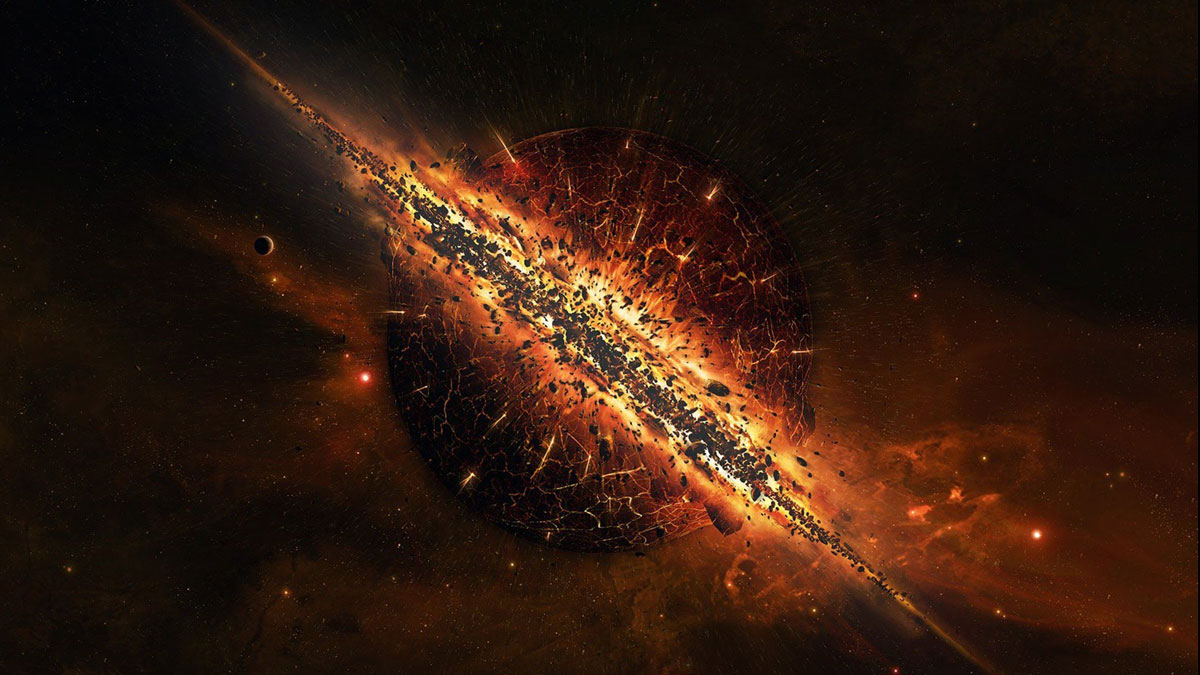Big Rip: how a cosmic face-off could 'end the universe'
If dark energy triumphs over gravity, the universe might vanish from view, according to a new theory

A free daily email with the biggest news stories of the day – and the best features from TheWeek.com
You are now subscribed
Your newsletter sign-up was successful
The universe – and all its planets and galaxies – could expand so much that it eventually tears apart and vanishes in a "Big Rip", according to a new theoretical model. The dramatic cosmic finale has been predicted by experts at Vanderbilt University in Tennessee…
What is a Big Rip?
Scientists at Vanderbilt say the universe could eventually expand to such a degree that everything from galaxies to planets to atoms will be torn apart and disappear. "The idea of the Big Rip is that eventually even the constituents of matter would start separating from each other," mathematician Dr Marcelo Disconzi tells The Guardian. "You'd be seeing all the atoms being ripped apart… it's fair to say that it's a dramatic scenario."
The Week
Escape your echo chamber. Get the facts behind the news, plus analysis from multiple perspectives.

Sign up for The Week's Free Newsletters
From our morning news briefing to a weekly Good News Newsletter, get the best of The Week delivered directly to your inbox.
From our morning news briefing to a weekly Good News Newsletter, get the best of The Week delivered directly to your inbox.
When will this happen?
There's no need to down tools at work just yet – the predicted doomsday is not predicted to happen for another 22 billion years.
Is there any way it can be avoided?
Disconzi believes that the ultimate destiny of the universe will depend on a gladiatorial battle between two opposing cosmic forces. "You have this competition between dark energy, that tries to expand the universe, and gravity, that tends to make it collapse again," he said. "The question is: who wins?" If dark energy, believed to make up about 70 per cent of the universe, triumphs over gravity there could be a Big Rip. "Under the rip scenario, dark energy gets stronger and you get this wild expansion that essentially rips space-time apart," says Professor Carlos Frenk, a cosmologist at the University of Durham. "The universe would vanish in front of your eyes. Basically, you don't want to be around for it."
A free daily email with the biggest news stories of the day – and the best features from TheWeek.com
How much consensus is there?
Scientists are now reasonably convinced that the universe began with the Big Bang, around 13.8 billion years ago, says The Guardian. This started at a pinpoint of incredibly high density and expanded to today's universe. However, the way in which the universe might end remains a hot potato for experts. "The only thing we definitely know is that the universe is expanding and that the rate is accelerating," said Disconzi. "That's about the only thing we know for sure."
-
 6 of the world’s most accessible destinations
6 of the world’s most accessible destinationsThe Week Recommends Experience all of Berlin, Singapore and Sydney
-
 How the FCC’s ‘equal time’ rule works
How the FCC’s ‘equal time’ rule worksIn the Spotlight The law is at the heart of the Colbert-CBS conflict
-
 What is the endgame in the DHS shutdown?
What is the endgame in the DHS shutdown?Today’s Big Question Democrats want to rein in ICE’s immigration crackdown
-
 Nasa’s new dark matter map
Nasa’s new dark matter mapUnder the Radar High-resolution images may help scientists understand the ‘gravitational scaffolding into which everything else falls and is built into galaxies’
-
 Moon dust has earthly elements thanks to a magnetic bridge
Moon dust has earthly elements thanks to a magnetic bridgeUnder the radar The substances could help supply a lunar base
-
 How Mars influences Earth’s climate
How Mars influences Earth’s climateThe explainer A pull in the right direction
-
 The ‘eclipse of the century’ is coming in 2027
The ‘eclipse of the century’ is coming in 2027Under the radar It will last for over 6 minutes
-
 NASA discovered ‘resilient’ microbes in its cleanrooms
NASA discovered ‘resilient’ microbes in its cleanroomsUnder the radar The bacteria could contaminate space
-
 Artemis II: back to the Moon
Artemis II: back to the MoonThe Explainer Four astronauts will soon be blasting off into deep space – the first to do so in half a century
-
 The mysterious origin of a lemon-shaped exoplanet
The mysterious origin of a lemon-shaped exoplanetUnder the radar It may be made from a former star
-
 The 5 biggest astronomy stories of 2025
The 5 biggest astronomy stories of 2025In the spotlight From moons, to comets, to pop stars in orbit